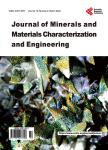Effect of Calcium Nitrate and Sodium Nitrite on the Rebar Corrosion of Medium Carbon Steel in Seawater and Cassava Fluid
Effect of Calcium Nitrate and Sodium Nitrite on the Rebar Corrosion of Medium Carbon Steel in Seawater and Cassava Fluid作者机构:Department of Metallurgical Engineering Kogi State Polytechnic Lokoja Nigeria Department of Materials Science and Engineering Obafemi Awolowo University Ile-Ife Nigeria
出 版 物:《Journal of Minerals and Materials Characterization and Engineering》 (矿物质和材料特性和工程(英文))
年 卷 期:2014年第2卷第3期
页 面:223-229页
学科分类:1002[医学-临床医学] 100214[医学-肿瘤学] 10[医学]
主 题:Inhibitor Rebar Corrosion Steel Seawater Cassava Fluid
摘 要:Inhibitors are regularly used as one of the principal prevention and control techniques in reinforcement corrosion. Hence this study investigates the effect of calcium nitrate and sodium nitrite inhibitors on the rebar corrosion of medium carbon steel in seawater and cassava fluid with a view to determining inhibitive potentials of the different inhibitors in the two media. Gravimetric and voltametric techniques were employed in this study and a total of forty-five corrosion coupons of different dimensions were produced. Forty coupons were used for gravimetric analysis and the remaining five for corrosion potentials measurements. Eight of the samples were used as control;while other eight samples each were admixed with calcium nitrate and sodium nitrite in concrete cubes. It was later immersed in seawater and cassava fluid for a total duration of 32 days and the measurements were taken at the interval of 4 days in order to determine the corrosion rates in mils per year (mmpy). Two controls and admixed samples each were later immersed in seawater and cassava fluid, respectively, for durations of 32 days to determine the corrosion potentials using a voltmeter and a Copper-Copper Sulphate Electrode (Cu/CuSO4). The pH of each medium was measured throughout the period of exposure. The results obtained expressed that all the samples except the control samples, displayed some degree of inhibition. The inhibition levels for the admixed samples in seawater were higher compared with those in cassava fluid. Inhibition efficiencies for various inhibitors followed different trends in different environment. The inhibition efficiencies for calcium nitrate in cassava fluid and seawater were 26.81% and 64.85% respectively. The study concluded that inorganic inhibitors were effective in inhibiting corrosion in cyanide and chloride contaminated concrete cubes.



